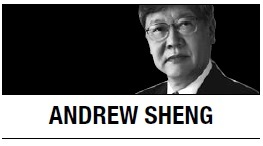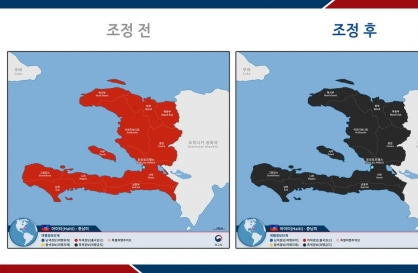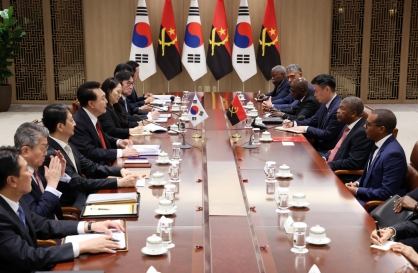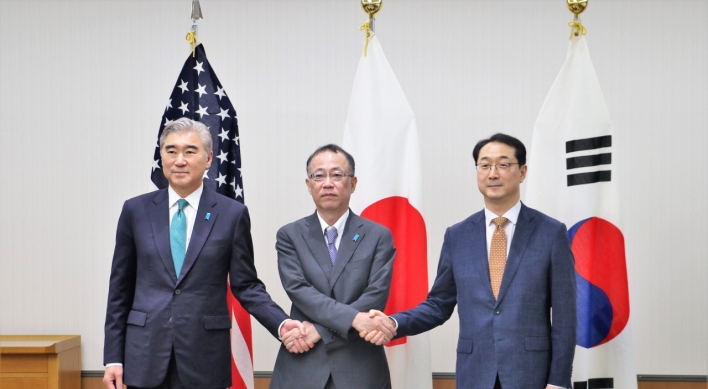[Andrew Sheng] Deconstructing Trump policies for Asia -- It's the border tax, stupid!
By Korea HeraldPublished : March 8, 2017 - 17:41
 US President Donald Trump finally sounded presidential in his address to the US Congress last week, after a tumultuous first month of sound and fury in tweets, executive orders and policy switches that left friends and foes around the world in total confusion.
US President Donald Trump finally sounded presidential in his address to the US Congress last week, after a tumultuous first month of sound and fury in tweets, executive orders and policy switches that left friends and foes around the world in total confusion.But listening to and watching President Trump’s showmanship carefully, there is method to his seeming erratic messages. They drive his opponents mad because they seem to disregard facts, logic or context. But the simple tweets in 140 characters convey very simple messages to his followers that he is delivering on what he promised -- a strong America and America first.
Trump is the first 21st-century politician using 21st-century technology to deliver his messages to the people, bypassing the traditional media, intellectuals, bureaucracy and establishment -- what his chief strategist Steve Bannon defines as the “swamp.”
Trump’s tweets reduce complexity to simplicity -- appealing to the gut. He diverts attention by making outrageous, politically incorrect points in order to gain a tactical advantage.
This is not the classic dictum “the medium is the message,” but rather “the message is the action.” Whether what is promised can be delivered is less relevant than whether the tweet strikes a political nerve. The technology of the 21st century is all about instant gratification.
There is an ancient Chinese text by an unknown author called “Thirty-Six Stratagems” that probably dates back to the Warring States period (475-221 BC) that can be used to interpret the real signal behind what the Trump strategists mean and intend to do.
The first of the 36 stratagems is “Crossing the Sea by Fooling Heaven.” The parable is about how to achieve one’s objective by deluding the masses by acting in the open, but diverting everyone’s attention. The theme of the stratagem is that the best secrets are those right in the open -- you signal left and turn right.
However outrageous, preposterous and seemingly illogical, Trump and his team have been consistent in one key message -- he will deliver on his promises to his supporters. The more sound and fury against Trump, the more the media and the Democrats make the man.
Steve Bannon, the White House chief strategist, stirred emotions when he suggested in an interview with the press two weeks ago about “deconstructing the administrative state.”
There are three vertical buckets in his strategy -- the delivery of stronger defense and homeland security; the economic nationalism of “re-constructing” trade arrangements, such as rejecting TPP; and thirdly, deconstruction of the administrative state in winding back regulations and the bureaucracy. All these appeal to the right wing of the Republican Party, who reject the liberal order that increased the size of government and the bureaucracy, creating more regulations and welfare that sapped the power of what Bannon called “enlightened capitalism,” the freedom to do business without the shackles of high taxes and big bureaucracy.
So far, the financial markets are cheering on the Trump administration, even though much of the promises have yet to be delivered. The reason is because all the major proposals appear to be pro-business -- reduction in income tax, $1 trillion in infrastructure, $54 billion on additional defense, cutting welfare costs (Obamacare) and kicking out illegal “bad dudes.” If delivered (a big “if” for all measures), these are positive for short-term growth, inflation and job creation.
The more the Democrats argue against these proposals, the more they set themselves up as the scapegoat if Trump’s promises cannot be delivered.
Politics aside, how is all such spending going to be paid for? The answer is the border tax.
Most believers in free trade and the current multilateral system forget that the Trump administration is moving toward a series of bilateral negotiations, which means the multilateral system will be “deconstructed” by starving it from new resources. These may include contributions to foreign aid, the Environmental Protection Agency and the like.
Trump’s team is cleverly co-opting the cross-border tax idea, pushed hard by Paul Ryan, the Republican Speaker of the House, to finance their policies going forward. The tax works on making import costs nondeductible, which according to a Peterson Institute study, is equivalent to a 25 percent subsidy on exports and 25 percent tax on imports. In the short run, this will reduce the US trade deficit, which is consistent with the “Make America Strong” theme. Furthermore, it will fuel inflation, exactly what is required to reduce the US debt burden.
From this side of the Pacific, no one should be lulled by the fact that Trump has reversed course and endorsed the “One-China Policy.” The main victim of a border tax, which is almost certain to come, will be China and Asia, because that is the largest source of American imports, other than Canada and Mexico. After all, the border tax is not aimed at Asia, but the effect is the same.
Thus, to dismiss the noise coming out of what appears to be chaotic and conflicting messages from the White House amidst cacophony of media and bureaucrats arguing against the Trump policies, is to miss the deep threat of the Trump signal -- he will restore American exceptionalism by deconstructing the multilateral balanced order.
In tweet form, the biggest threat to Asian growth is the border tax.
The English philosopher of science, Stephen Toulmin (1922-2009) argued that in the shift from modernity to postmodernity, there are two paths -- one forward-looking in facing the future, and the other nostalgic and backing into old ideas of religious purity and nationalism. Trumpland is not about the end of history, as forecast in 1990 by political scientist Francis Fukuyama, but about the return or revenge of history, in which American nationalism and protectionism is returning to its historical roots.
Managing this tumultuous change in political course will require all the wisdom of Asian classics. When the elephant charges, the last of the 36 stratagems may be the smartest for many: “To run is the best stratagem.” The trouble in an increasingly small world is that you can run, but you can’t hide.
By Andrew Sheng
Andrew Sheng writes on global issues from an Asian perspective. -- Ed.
(Asia News Network)
-
Articles by Korea Herald



















